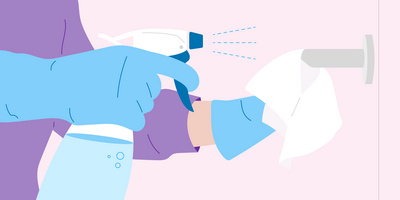
Vaccines Aren’t the Only Way to Stay Healthy this COVID, Flu & RSV...
This article has been updated for the 2023–2024 flu season.By now you’re probably expecting to hear about...
Read moreHelp patients book appointments with you on Solv. It's free!
0 instant-book locations










Help patients book appointments with you on Solv. It's free!
The chickenpox vaccine, also known as the varicella vaccine, may reduce your risk of developing chickenpox. Learning more about what this vaccine does and who should get it can help you make an informed health care decision for yourself and your family.
Chickenpox, or varicella, is a highly contagious disease caused by the varicella-zoster virus. According to the CDC, the primary symptom of chickenpox is an itchy, blister-like rash that first appears on the chest, back, and face before spreading to the rest of the body. Other symptoms include fever and tiredness.
Having two doses of the chickenpox shot is about 90% effective at preventing chickenpox, which means it’s possible you may still get this disease after being vaccinated, adds the CDC. This vaccine is recommended for children, teens, and adults who have never had chickenpox and who have never been vaccinated for it.
The CDC recommends two doses of the chickenpox vaccine for children, teens, and adults.
Children are recommended to receive their first dose of the chickenpox vaccine between 12 and 15 months and the second dose between four and six years. The CDC adds that children may receive the second dose at an earlier age if it is given at least three months after the first dose.
Those 13 years and older who have never had chickenpox or received the chickenpox vaccine should get two doses spaced at least 28 days apart. The CDC says the chickenpox vaccine is especially important for certain populations, including healthcare workers, teachers, college students, nursing home residents, and international travelers.
Talk to your healthcare provider about whether you may need the chickenpox vaccine based on your health situation.
You do not need the chickenpox vaccine if you have evidence of immunity against this disease, reports the CDC. Evidence of immunity includes being born in the United States before 1980 and a confirmed diagnosis of a history of chickenpox, among other reasons.
Other people who should not get the chickenpox vaccine, according to the CDC, include:
Some people should check with their doctors before getting the chickenpox vaccine. According to the CDC, this includes:
There are currently two types of chickenpox vaccines licensed for use in the United States. The brand names of these vaccines are Varivax® and ProQuad®, according to the CDC.
Varivax® contains only the chickenpox vaccine. This vaccine is licensed for use only in adults, teens, and children aged 12 months and older.
ProQuad® combines the chickenpox vaccine with the vaccines for measles, mumps, and rubella. This vaccine is licensed for use only in children between 12 months and 12 years, says the CDC.
If you are exposed to chickenpox, the CDC recommends getting vaccinated for chickenpox within three to five days of exposure. It adds that getting two doses of the vaccine is recommended even if more than five days have passed since you were exposed. Each of these doses should be separated by at least 28 days.
Many states have laws in place that require children to be vaccinated against chickenpox if they are attending public school, private school, or a daycare facility. However, all states provide medical exemptions for the chickenpox vaccine, while some states also offer exemptions for religious and/or philosophical reasons, reports the CDC.
Your healthcare provider can talk to you in greater detail about whether or not your children should get the chickenpox vaccine based on your family’s religious and philosophical views and on your children’s medical histories.
The chickenpox vaccine is covered by most health insurance plans, reports the CDC. If your health insurance plan does not cover the cost of the chickenpox vaccine for your children, the Vaccines for Children (VFC) program may help. The CDC recommends contacting VFC directly to determine if you’re eligible to receive financial assistance through this program.
Varivax® and ProQuad® are the two chickenpox vaccines licensed for use in the United States. Varivax® can be used in people aged 12 months and older, while ProQuad® can be used only in children between the ages of 12 months and 12 years, according to the CDC.
The chickenpox vaccine can be given as early as the age of 12 months, reports the CDC. Consult with your doctor if you have not received the chickenpox vaccine or want to learn more about the CDC’s recommended vaccine schedule.
Shingles is a painful skin rash caused by the varicella-zoster virus, which is the same virus that causes chickenpox. According to the CDC, the chickenpox shot does not prevent shingles. The Washington State Department of Health recommends getting the shingles vaccine even if you have already received the chickenpox vaccine.
There are two types of chickenpox vaccines licensed for use in the United States. The brand names of these vaccines are Varivax® and ProQuad®, reports the CDC.
The chickenpox vaccine became available in the United States in 1995, says the CDC. Before then, chickenpox was very common and caused an estimated 100 to 150 deaths every year.
In regards to chickenpox vaccine history, this vaccine became a requirement for children attending public schools, private schools, and daycare facilities in 36 states and Washington, D.C. for the 2011 to 2012 school year, reports the CDC. However, some states allow medical, religious, and philosophical exemptions for this vaccine.
You can only get chickenpox once in your lifetime, reports the National Library of Medicine (NLM). However, this virus remains dormant in your nervous system, and can cause shingles later on in life even if you are vaccinated against chickenpox, adds the NLM.
Chickenpox usually occurs in childhood, but can also happen during adulthood, reports the CDC. It adds that getting the chickenpox vaccine can reduce your risk for this virus by up to 90%.
If you’ve already received the chickenpox vaccine, getting the shingles is still possible. The Washington State Department of Health recommends getting the shingles vaccine even if you’ve already had chickenpox or the chickenpox vaccine.
Use Solv to find a highly rated provider in your area that offers the chickenpox vaccine and other vaccinations. Solv features an online directory of healthcare providers, including urgent care centers and walk-in clinics, so that you can receive immediate, high-quality medical attention on the same day. Go to the main page on Solv, type in “vaccinations,” and book a same-day appointment directly from the website.

Updated on Nov 25, 2024
Solv has strict sourcing guidelines and relies on peer-reviewed studies, academic research institutions, and medical associations. We avoid using tertiary references.
Chickenpox Vaccine
DOT Exam
Ear Wax Removal
Flu Shot
Hepatitis Vaccine
Measles Vaccine (MMR)
Physical Exam
Shingles Vaccine
Sports Physicals
Tetanus Shot
Typhoid Vaccine
Yellow Fever Vaccine
Tips, advice, news—your resource to stay healthy and safe while improving your experience with healthcare providers when you need them.